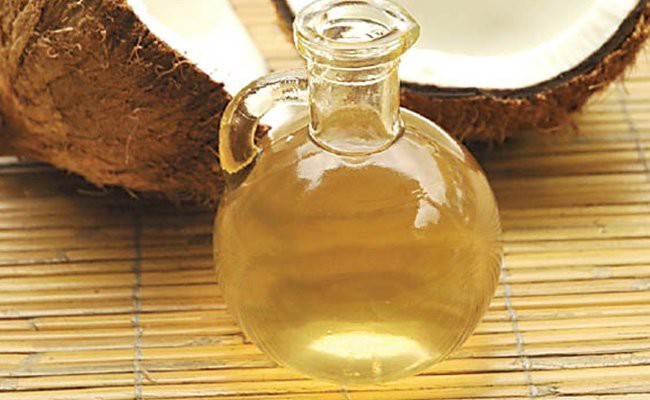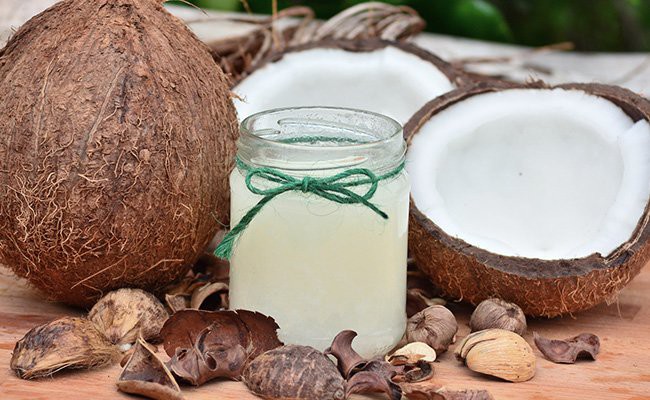- What Is Coconut Oil? Is Coconut Oil Safe For Dogs?
- Health Benefits Of Coconut Oil For Dogs
- Healthy Coat And Skin
- How Much Coconut Oil Should I Give Dogs?
- Effects Of Coconut Oil On Dog’s Digestive Tract
- How To Topically Use Coconut Oil On Dogs?
- What Are The Other Better Alternatives To Coconut Oil?
- Side Effects Of Coconut Oil
- How To Choose The Right Coconut Oil For Your Dog?
- Is It Safe To Brush Your Dog’s Teeth With Coconut Oil?
Dog Pregnancy Calculator And Timeline
Coconut oil may have garnered lots of attention for its beneficial properties but pet owners have started realizing its significance recently. Moreover, coconut oil may well prove that it’s just not an overnight sensation or fad. To begin with, coconut oil can help dogs ranging from bumpy or itchy skin to digestion problems. But most pet owners and lovers are asking: How coconut oil benefits dogs? Therefore, is coconut oil safe for dogs? or what are the side-effects of using coconut oil for dogs? Find Out!!
What Is Coconut Oil? Is Coconut Oil Safe For Dogs?
Firstly, coconut oil comes directly from the coconut meat harvested for cultivation. Furthermore, coconut oil contains saturated fats around 90% and most are MCTs or Medium Chain Triglycerides.
The main components of coconut oil are
- Other acids – monosaturated or polyunsaturated fatty acids.
- Caprylic or Capric acid – Contains anti-viral, anti-fungal, and anti-bacterial properties.
- MCTs present in coconut oil quickly metabolizes and provides energy.
Health Benefits Of Coconut Oil For Dogs
Some of the health benefits of coconut oil for dogs are
- Removes body odor.
- Makes dog’s coat rich and shiny.
- Improves and helps skin conditions such as dry and itchy skin, stings, bites, tick bites, and hot spots.
- In addition, shampoos containing coconut oil can reduce allergens and improve damaged skin.
- Benefits bone health, arthritis, weight loss, and metabolic function.
- MCTs- Many vets claim that it improves digestion, mental, and brain function in dogs. Not to mention, MCTs help reduce weight in dogs, keep thyroid under balance, and improves the lifestyle of sedentary dogs.
- Coconut oil has the potential to slow cognitive dysfunction.
- Moreover, coconut oil is effective to use as a coating to help dogs swallow pills easily.
- In fact, they can be used to freshen or smooth a dog’s coat.
Healthy Coat And Skin
- Topical application can improve wound healing
- Stops and treats fungal and yeast infections
- Manages allergic reactions
- Reduces doggy smell
- Improves itchy skin, controls dermatitis, and flea allergies
- Prevents eczema
How Much Coconut Oil Should I Give Dogs?
When you start, you better begin with less amount of coconut oil and then increase it gradually.
Moreover, you should consult your vet before including coconut oil in his diet.
Start with a ¼ teaspoon 1-2 times per day and it also depends on the size of your dog.
In the case of big dogs, 1 teaspoon is enough and any overweight or obese dog should not be fed more than once.
Experts suggest mixing vitamin D and turmeric along with coconut oil for snacks. Not to mention, vitamin D remains fat soluble and turmeric functions as an anti-inflammatory product.
Therefore, experts recommend the usage of cold-pressed, virgin, organic coconut oil.
Effects Of Coconut Oil On Dog’s Digestive Tract
- Manages cough-related troubles
- Eliminates or reduces bad mouth odor
- Heals inflammatory bowel syndrome and helps with colitis
- Improves nutrient absorption
- Enhances digestion
How To Topically Use Coconut Oil On Dogs?
- ding the right amount of coconut oil prevents flaking and increases the moisture content of your dog’s coat.
- A light touch or dabbing your dog’s coat with coconut oil helps keep your dog’s coat clean and tidy.
- In brief, simply take a few drops of doggie coconut oil and gently massage a few drops of coconut oil onto the skin. Wait for some time for the coat to absorb the applied oil.
- On the contrary, you don’t have to worry even if your dog licks their coat as coconut oil is not toxic to dogs.
What Are The Other Better Alternatives To Coconut Oil?
For example, foods that are heavy in omega 3 fatty acids are flax oil seeds, salmon oil, and cold water oils, especially fish.
Not to mention, you should monitor your dog’s intake and better consult a vet before feeding your dog with coconut oil.
Side Effects Of Coconut Oil
Some of the common side-effects of coconut oil for dogs
- Large doses of coconut oil can result in diarrhea or greasy stools
- Overweight dogs may find it difficult to digest coconut oil. So, in this case, consult your family vet.
- Dogs suffering from inefficient fat metabolization, pancreatitis, should not be administered coconut oil without expert supervision.
- In essence, a single tablespoon of coconut oil adds around 120 calories and also raises the level of bad cholesterol.
How To Choose The Right Coconut Oil For Your Dog?
Tips for choosing the right coconut oil
- Select virgin coconut oil or cold-pressed oils.
- For internal feeding, you should remember that different coconut oils offer different tastes and smells. For instance, there are lots of varieties including nutty, smooth, buttery, and bland, etc.
- Overall, a quick visit to your family vet may help you choose a better product, ultimately safe for your dog.
Is It Safe To Brush Your Dog’s Teeth With Coconut Oil?
Yes. As soon as you have your dog’s plaque under control, you can regularly use a pet brush to apply coconut oil.
Also if your dog suffers from bad odour, kindly add a few drops of parsley oil and coconut oil to the toothbrush. Moreover, a probiotic mouthwash looks good for oral health.
Overall, the most effective way is to mix a probiotic supplement and 1 tablespoon of pure coconut milk and feed your dog. This mixture will reduce the growth of pathogens without antibiotics.























